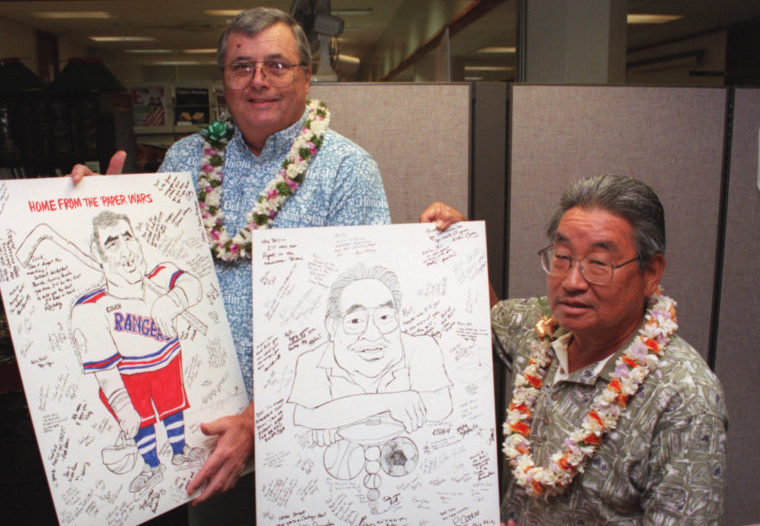Quick Reads: Dick Couch’s words were as witty and powerful as his heart was warm

Dick Couch, the legendary retired Star-Bulletin sportswriter who died Thursday at age 83, was employed by two newspapers during his journalism career that spanned more than 40 years. After college at Illinois and a hitch in the Army he started out at the Daily Mirror in his hometown of New York.
For several years in the 1960s he didn’t get his paycheck from a paper. But he wrote for hundreds of them — all of them that depended on the Associated Press for sports stories from The Big Apple. When he wrote for AP, his work often appeared in papers coast to coast (and here in Hawaii) … sometimes with a byline over the story, sometimes not.
Deadline is bad enough when you’re writing for one paper; when every second is another second clients have to wait the time pressure is immense (and in those days, many clients could choose between AP and its main competitor, United Press International). Editors around the entire country await your story — and not just papers, broadcast outlets, too.
So Dick could write very quickly when he needed to, and was always spot-on accurate. But by the time this skinny 20-year-old met him at the Star-Bulletin in 1981, Dick usually had plenty of time to craft his football game stories and columns … and he used that time. Because the SB was a PM paper and did not publish on Sundays (there was a joint operating agreement with the AM Advertiser, which handled the Sunday sports), he had more than 30 hours to work on his story from Saturday night’s game for Monday’s paper. (There was no such thing as writing a breaking story or in-game blog for the internet, because there was no internet yet; but with his wire service experience, Dick would’ve been awesome at it.)
“As a child I remember waking up in the middle of the night to the sound of a clacking Smith-Corona (typewriter),” said Dick’s son, Richard, who followed his dad’s path as a sportswriter. “He was meticulous, rewriting his own work. He was not satisfied with the first draft, the second draft or the third draft. And oftentimes the first draft was as good as anyone else could do.”
I saw this myself, at the office. Dick was a superstar, but extremely approachable. He was big-time, but he never big-timed anyone.
But I knew not to bother him on the day he was writing. Free from the wire service deadline, Dick was the ultimate grinder. Countless hours after he started, there’d be a masterpiece … and the way it read you’d never think he’d grimaced his way through it, filling the ashtray next to him.
“He agonized. But his stuff read fluid and was fun to read. It was a brutal, brutal process, and no one would ever guess that. It was an important lesson,” said Paul Carvalho, himself a retired Hawaii sportswriting legend who, like many of us, was a Dick Couch protege. “You wanted to be in the same ballpark with him. You knew you weren’t going to be the same level, but you wanted to try to be good enough to play in the same lineup. He taught me what it would take for me to do the job.”
As serious and meticulous as Dick was as a writer, he was helpful and kind as a mentor. He had just the right touch as a copy editor. As Paul said, when Dick edited a story, the result wasn’t just a better story, but a better writer, too. (Dick edited many of my stories as I was learning to write, and I agree; Paul had that trait as an editor, too.)
For most of the 1980s, my daytime job was copy boy for the Star-Bulletin city desk. (Replace “copy” with “errand” to get an idea of what it entailed.) Somehow, despite my incompetence at it, I managed not to get fired for seven years. During this period, Dick would often tell me stories about his days as a copy boy … I didn’t realize it then, but between the lines he was telling me to hang in there. I got my foot in the door of the sports department early, but it took nearly 20 years for the rest of me to get through as a full-timer. Learning from Dick and the other veterans and being accepted as their friend helped me not give up.
As a friend, Dick was caring and carefree at the right times. He was the sports department’s unofficial social director. We played softball and basketball and Jim Easterwood (another very good friend and legend we lost, last fall) got Dick hooked on tennis. Dick started our fantasy baseball league, which I think was the first in Hawaii.
For a couple of years in the late 1990s I got to work with both Dick and Richard at the Star-Bulletin.
On Thursday, after Richard told me the sad news about his dad, he recalled a story he can laugh about now. But it wasn’t very funny for Richard back when he was in middle school. In those days, kids in Hawaii read the newspaper — and, apparently, they especially liked “Dick’s Picks,” his dad’s football prediction column.
One week, Dick decided to favor Richard’s flag football team to win its upcoming game. You guessed it … Richard’s team got beat because his dad had provided the opponents with the proverbial locker-room wallpaper.
Yes, his words had plenty of effect.
That was still true nationally, too, 15 years after he’d left New York. Most University of Hawaii football fans know that Al Noga is the program’s only Associated Press football first-team All-American. What many don’t know is Noga cemented that spot in 1986 based on the recommendation of a former AP sportswriter named Dick Couch.
COMMENTS